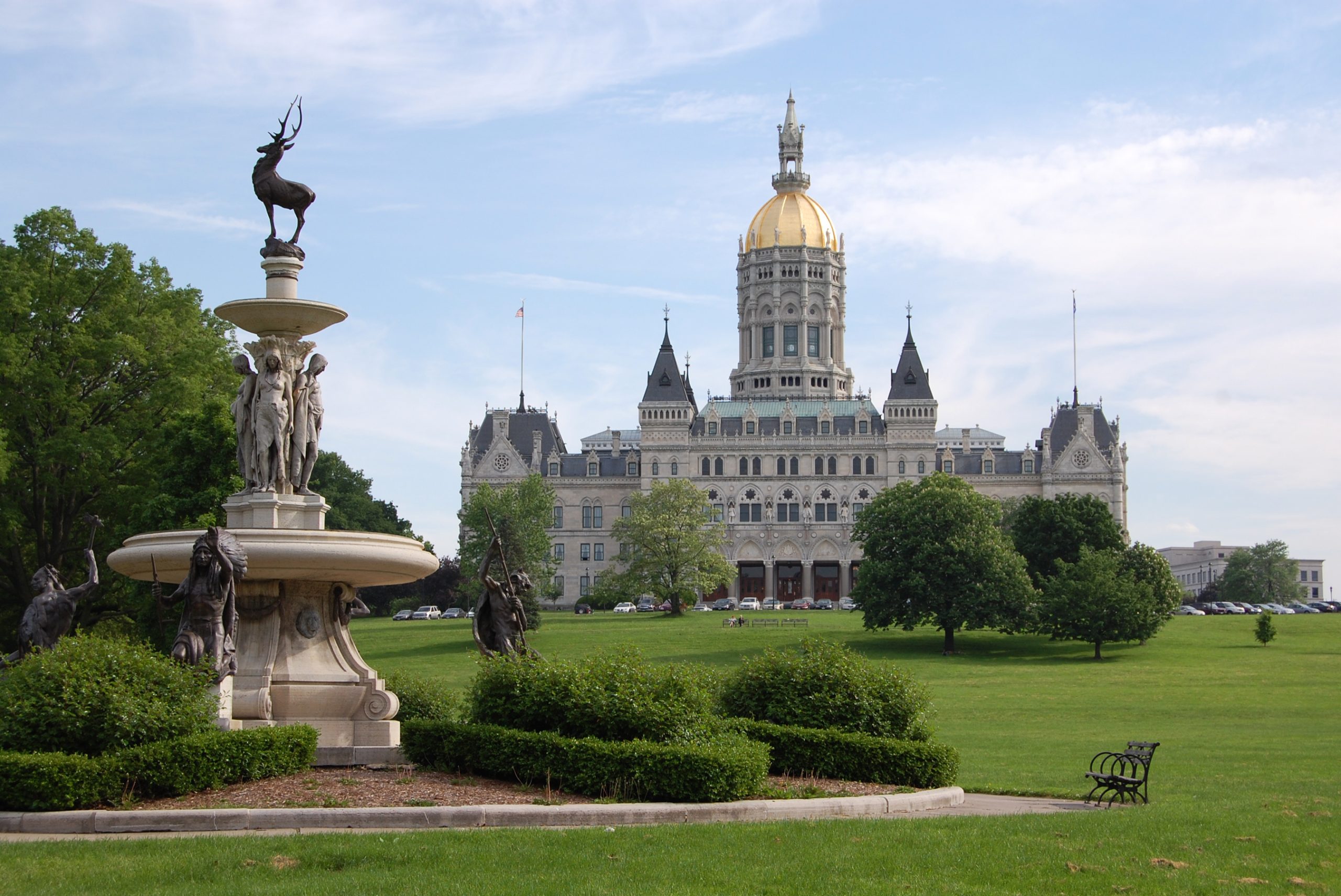Connecticut’s recent state elections brought some changes to the Senate and House while leaving key leadership positions and party dominance intact. Although constitutional offices (governor, lieutenant governor, attorney general, treasurer, comptroller and secretary of state) were not up for election, results from the state Senate and House are shaping the landscape for Connecticut’s Legislature.
State Senate
In the Connecticut state Senate, a few Republican incumbents faced tough races:
Vulnerable Republicans. Three Republican incumbents were considered vulnerable. Sens. Tony Hwang, R-28, and Ryan Fazio, R-36, successfully held onto their seats. Sen. Lisa Seminara, R-8, conceded her race shortly after Election Day. However, Seminara withdrew her concession a week later—following an automatic recount that closed the nearly 2,000 vote lead held by Democratic challenger Paul Honig, to less than a 200-vote lead.
Vulnerable Democrat. Democratic Sen. Mae Flexer, D-29—representing the UConn area in northeastern Connecticut—declared victory a close race. Flexer defeated her Republican challenger, Chris Reddy, by less than 600 votes. However, Reddy has not yet conceded the election.
Should the results hold, the Connecticut state Senate will likely either maintain its composition or see Democrats gain one seat, giving them a majority of 25–11. Senate leadership is expected to remain steady, with Sens. Martin Looney, D-11, and Bob Duff, D-25, anticipated to continue leading the Democrats and Sen. Kevin Kelly, D-21, leading Senate Republicans.
State House of Representatives
The State House saw a night of victories for Democrats:
Democratic gains. Democrats flipped five seats previously held by Republicans. Republican incumbents who lost their seats include Representatives Holly Cheeseman, R-37, Kathleen McCarty, Laura Dancho, R-120, and Rachel Chaleski, R-138. Additionally, MJ Shannon won an open seat for the 117th District that had been Republican-held, completing the five-seat swing.
Overall majority. With these additional seats, Democrats are expected to expand their House membership from 98 to 103—achieving a supermajority of 103–48. This supermajority would allow Democrats to pass legislation without requiring Republican votes to override a governor’s veto.
Only one vulnerable Democrat, Rep. Jaime Foster, D-57, successfully defended her seat. Notably Democrat Michelle Cook, who had served eight terms in the state House, was defeated by Republican challenger Joe Canino by less than 100 votes.
Leadership outlook
House Speaker Matt Ritter, D-1, and House Minority Leader Vincent Candelora, R-86, are expected to retain their leadership roles, ensuring stability despite the Democratic gains in the House. In the Senate, leadership is similarly anticipated to stay consistent, even with the potential increase in Democratic seats.
Implications for Connecticut politics
With a strengthened Democratic majority in both chambers—particularly the supermajority in the House—Democrats are positioned to advance their legislative priorities more assertively in the coming term.
This expanded influence could open doors for policy initiatives in areas such as education, health care and insurance. As the 2024 session approaches, both parties will be adjusting strategies in response to these new dynamics.

Bradford J. Lachut, Esq.
Bradford J. Lachut, Esq., joined PIA as government affairs counsel for the Government & Industry Affairs Department in 2012 and then, after a four-month leave, he returned to the association in 2018 as director of government & industry affairs responsible for all legal, government relations and insurance industry liaison programs for the five state associations. Prior to PIA, Brad worked as an attorney for Steven J. Baum PC, in Amherst, and as an associate attorney for the law office of James Morris in Buffalo. He also spent time serving as senior manager of government affairs as the Buffalo Niagara Partnership, a chamber of commerce serving the Buffalo, N.Y., region, his hometown. He received his juris doctorate from Buffalo Law School and his Bachelor of Science degree in Government and Politics from Utica College, Utica, N.Y. Brad is an active Mason and Shriner.
- Bradford J. Lachut, Esq.
- Bradford J. Lachut, Esq.
- Bradford J. Lachut, Esq.
- Bradford J. Lachut, Esq.
- Bradford J. Lachut, Esq.
- Bradford J. Lachut, Esq.
- Bradford J. Lachut, Esq.
- Bradford J. Lachut, Esq.
- Bradford J. Lachut, Esq.
- Bradford J. Lachut, Esq.
- Bradford J. Lachut, Esq.
- Bradford J. Lachut, Esq.
- Bradford J. Lachut, Esq.
- Bradford J. Lachut, Esq.
- Bradford J. Lachut, Esq.
- Bradford J. Lachut, Esq.
- Bradford J. Lachut, Esq.
- Bradford J. Lachut, Esq.
- Bradford J. Lachut, Esq.
- Bradford J. Lachut, Esq.
- Bradford J. Lachut, Esq.
- Bradford J. Lachut, Esq.
- Bradford J. Lachut, Esq.
- Bradford J. Lachut, Esq.
- Bradford J. Lachut, Esq.
- Bradford J. Lachut, Esq.
- Bradford J. Lachut, Esq.
- Bradford J. Lachut, Esq.
- Bradford J. Lachut, Esq.
- Bradford J. Lachut, Esq.
- Bradford J. Lachut, Esq.
- Bradford J. Lachut, Esq.
- Bradford J. Lachut, Esq.
- Bradford J. Lachut, Esq.
- Bradford J. Lachut, Esq.
- Bradford J. Lachut, Esq.
- Bradford J. Lachut, Esq.
- Bradford J. Lachut, Esq.
- Bradford J. Lachut, Esq.
- Bradford J. Lachut, Esq.
- Bradford J. Lachut, Esq.
- Bradford J. Lachut, Esq.
- Bradford J. Lachut, Esq.
- Bradford J. Lachut, Esq.
- Bradford J. Lachut, Esq.
- Bradford J. Lachut, Esq.
- Bradford J. Lachut, Esq.
- Bradford J. Lachut, Esq.
- Bradford J. Lachut, Esq.
- Bradford J. Lachut, Esq.
- Bradford J. Lachut, Esq.
- Bradford J. Lachut, Esq.
- Bradford J. Lachut, Esq.
- Bradford J. Lachut, Esq.
- Bradford J. Lachut, Esq.
- Bradford J. Lachut, Esq.
- Bradford J. Lachut, Esq.
- Bradford J. Lachut, Esq.
- Bradford J. Lachut, Esq.
- Bradford J. Lachut, Esq.
- Bradford J. Lachut, Esq.
- Bradford J. Lachut, Esq.
- Bradford J. Lachut, Esq.
- Bradford J. Lachut, Esq.
- Bradford J. Lachut, Esq.
- Bradford J. Lachut, Esq.
- Bradford J. Lachut, Esq.
- Bradford J. Lachut, Esq.
- Bradford J. Lachut, Esq.
- Bradford J. Lachut, Esq.
- Bradford J. Lachut, Esq.
- Bradford J. Lachut, Esq.
- Bradford J. Lachut, Esq.
- Bradford J. Lachut, Esq.
- Bradford J. Lachut, Esq.
- Bradford J. Lachut, Esq.
- Bradford J. Lachut, Esq.
- Bradford J. Lachut, Esq.
- Bradford J. Lachut, Esq.
- Bradford J. Lachut, Esq.
- Bradford J. Lachut, Esq.
- Bradford J. Lachut, Esq.
- Bradford J. Lachut, Esq.
- Bradford J. Lachut, Esq.
- Bradford J. Lachut, Esq.
- Bradford J. Lachut, Esq.
- Bradford J. Lachut, Esq.
- Bradford J. Lachut, Esq.
- Bradford J. Lachut, Esq.
- Bradford J. Lachut, Esq.
- Bradford J. Lachut, Esq.
- Bradford J. Lachut, Esq.
- Bradford J. Lachut, Esq.
- Bradford J. Lachut, Esq.
- Bradford J. Lachut, Esq.
- Bradford J. Lachut, Esq.
- Bradford J. Lachut, Esq.
- Bradford J. Lachut, Esq.
- Bradford J. Lachut, Esq.
- Bradford J. Lachut, Esq.
- Bradford J. Lachut, Esq.
- Bradford J. Lachut, Esq.
- Bradford J. Lachut, Esq.
- Bradford J. Lachut, Esq.
- Bradford J. Lachut, Esq.
- Bradford J. Lachut, Esq.
- Bradford J. Lachut, Esq.
- Bradford J. Lachut, Esq.
- Bradford J. Lachut, Esq.
- Bradford J. Lachut, Esq.
- Bradford J. Lachut, Esq.
- Bradford J. Lachut, Esq.
- Bradford J. Lachut, Esq.
- Bradford J. Lachut, Esq.
- Bradford J. Lachut, Esq.
- Bradford J. Lachut, Esq.
- Bradford J. Lachut, Esq.
- Bradford J. Lachut, Esq.
- Bradford J. Lachut, Esq.
- Bradford J. Lachut, Esq.
- Bradford J. Lachut, Esq.
- Bradford J. Lachut, Esq.
- Bradford J. Lachut, Esq.
- Bradford J. Lachut, Esq.
- Bradford J. Lachut, Esq.
- Bradford J. Lachut, Esq.
- Bradford J. Lachut, Esq.
- Bradford J. Lachut, Esq.
- Bradford J. Lachut, Esq.
- Bradford J. Lachut, Esq.
- Bradford J. Lachut, Esq.
- Bradford J. Lachut, Esq.
- Bradford J. Lachut, Esq.
- Bradford J. Lachut, Esq.
- Bradford J. Lachut, Esq.
- Bradford J. Lachut, Esq.
- Bradford J. Lachut, Esq.
- Bradford J. Lachut, Esq.
- Bradford J. Lachut, Esq.
- Bradford J. Lachut, Esq.
- Bradford J. Lachut, Esq.
- Bradford J. Lachut, Esq.
- Bradford J. Lachut, Esq.
- Bradford J. Lachut, Esq.
- Bradford J. Lachut, Esq.
- Bradford J. Lachut, Esq.
- Bradford J. Lachut, Esq.
- Bradford J. Lachut, Esq.
- Bradford J. Lachut, Esq.
- Bradford J. Lachut, Esq.
- Bradford J. Lachut, Esq.
- Bradford J. Lachut, Esq.
- Bradford J. Lachut, Esq.
- Bradford J. Lachut, Esq.
- Bradford J. Lachut, Esq.
- Bradford J. Lachut, Esq.
- Bradford J. Lachut, Esq.
- Bradford J. Lachut, Esq.
- Bradford J. Lachut, Esq.
- Bradford J. Lachut, Esq.
- Bradford J. Lachut, Esq.
- Bradford J. Lachut, Esq.
- Bradford J. Lachut, Esq.
- Bradford J. Lachut, Esq.
- Bradford J. Lachut, Esq.
- Bradford J. Lachut, Esq.
- Bradford J. Lachut, Esq.
- Bradford J. Lachut, Esq.
- Bradford J. Lachut, Esq.
- Bradford J. Lachut, Esq.
- Bradford J. Lachut, Esq.
- Bradford J. Lachut, Esq.
- Bradford J. Lachut, Esq.
- Bradford J. Lachut, Esq.
- Bradford J. Lachut, Esq.
- Bradford J. Lachut, Esq.
- Bradford J. Lachut, Esq.
- Bradford J. Lachut, Esq.
- Bradford J. Lachut, Esq.
- Bradford J. Lachut, Esq.
- Bradford J. Lachut, Esq.
- Bradford J. Lachut, Esq.
- Bradford J. Lachut, Esq.
- Bradford J. Lachut, Esq.
- Bradford J. Lachut, Esq.
- Bradford J. Lachut, Esq.
- Bradford J. Lachut, Esq.
- Bradford J. Lachut, Esq.
- Bradford J. Lachut, Esq.
- Bradford J. Lachut, Esq.
- Bradford J. Lachut, Esq.
- Bradford J. Lachut, Esq.
- Bradford J. Lachut, Esq.
- Bradford J. Lachut, Esq.
- Bradford J. Lachut, Esq.
- Bradford J. Lachut, Esq.
- Bradford J. Lachut, Esq.
- Bradford J. Lachut, Esq.
- Bradford J. Lachut, Esq.
- Bradford J. Lachut, Esq.
- Bradford J. Lachut, Esq.
- Bradford J. Lachut, Esq.
- Bradford J. Lachut, Esq.
- Bradford J. Lachut, Esq.
- Bradford J. Lachut, Esq.
- Bradford J. Lachut, Esq.
- Bradford J. Lachut, Esq.
- Bradford J. Lachut, Esq.
- Bradford J. Lachut, Esq.
- Bradford J. Lachut, Esq.
- Bradford J. Lachut, Esq.
- Bradford J. Lachut, Esq.
- Bradford J. Lachut, Esq.
- Bradford J. Lachut, Esq.
- Bradford J. Lachut, Esq.
- Bradford J. Lachut, Esq.
- Bradford J. Lachut, Esq.
- Bradford J. Lachut, Esq.
- Bradford J. Lachut, Esq.
- Bradford J. Lachut, Esq.
- Bradford J. Lachut, Esq.
- Bradford J. Lachut, Esq.
- Bradford J. Lachut, Esq.
- Bradford J. Lachut, Esq.
- Bradford J. Lachut, Esq.
- Bradford J. Lachut, Esq.
- Bradford J. Lachut, Esq.
- Bradford J. Lachut, Esq.
- Bradford J. Lachut, Esq.
- Bradford J. Lachut, Esq.
- Bradford J. Lachut, Esq.
- Bradford J. Lachut, Esq.
- Bradford J. Lachut, Esq.
- Bradford J. Lachut, Esq.
- Bradford J. Lachut, Esq.
- Bradford J. Lachut, Esq.
- Bradford J. Lachut, Esq.
- Bradford J. Lachut, Esq.
- Bradford J. Lachut, Esq.
- Bradford J. Lachut, Esq.
- Bradford J. Lachut, Esq.
- Bradford J. Lachut, Esq.
- Bradford J. Lachut, Esq.
- Bradford J. Lachut, Esq.
- Bradford J. Lachut, Esq.
- Bradford J. Lachut, Esq.
- Bradford J. Lachut, Esq.
- Bradford J. Lachut, Esq.
- Bradford J. Lachut, Esq.
- Bradford J. Lachut, Esq.
- Bradford J. Lachut, Esq.
- Bradford J. Lachut, Esq.
- Bradford J. Lachut, Esq.
- Bradford J. Lachut, Esq.
- Bradford J. Lachut, Esq.
- Bradford J. Lachut, Esq.
- Bradford J. Lachut, Esq.
- Bradford J. Lachut, Esq.
- Bradford J. Lachut, Esq.
- Bradford J. Lachut, Esq.
- Bradford J. Lachut, Esq.
- Bradford J. Lachut, Esq.
- Bradford J. Lachut, Esq.
- Bradford J. Lachut, Esq.
- Bradford J. Lachut, Esq.
- Bradford J. Lachut, Esq.
- Bradford J. Lachut, Esq.
- Bradford J. Lachut, Esq.
- Bradford J. Lachut, Esq.
- Bradford J. Lachut, Esq.
- Bradford J. Lachut, Esq.
- Bradford J. Lachut, Esq.
- Bradford J. Lachut, Esq.
- Bradford J. Lachut, Esq.
- Bradford J. Lachut, Esq.
- Bradford J. Lachut, Esq.
- Bradford J. Lachut, Esq.
- Bradford J. Lachut, Esq.
- Bradford J. Lachut, Esq.
- Bradford J. Lachut, Esq.
- Bradford J. Lachut, Esq.
- Bradford J. Lachut, Esq.
- Bradford J. Lachut, Esq.
- Bradford J. Lachut, Esq.
- Bradford J. Lachut, Esq.
- Bradford J. Lachut, Esq.
- Bradford J. Lachut, Esq.
- Bradford J. Lachut, Esq.
- Bradford J. Lachut, Esq.
- Bradford J. Lachut, Esq.
- Bradford J. Lachut, Esq.
- Bradford J. Lachut, Esq.
- Bradford J. Lachut, Esq.
- Bradford J. Lachut, Esq.
- Bradford J. Lachut, Esq.
- Bradford J. Lachut, Esq.
- Bradford J. Lachut, Esq.
- Bradford J. Lachut, Esq.
- Bradford J. Lachut, Esq.
- Bradford J. Lachut, Esq.
- Bradford J. Lachut, Esq.
- Bradford J. Lachut, Esq.
- Bradford J. Lachut, Esq.
- Bradford J. Lachut, Esq.
- Bradford J. Lachut, Esq.
- Bradford J. Lachut, Esq.
- Bradford J. Lachut, Esq.





